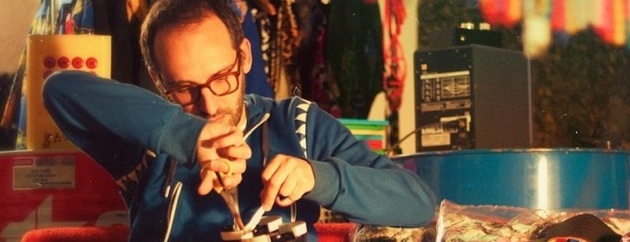
Review Batida
Electrifying the global dance scene, Batida incorporates traditional Angolan rhythms with modern electronic beats. Angolan / Portuguese DJ Mpula aka Pedro Coquenão has arrived at an electro-traditional sound, that integrates photography, video, Carnaval, and politics in a vast array of dance music. The self-titled Batida album is an experienced project, but a brand new concept for Soundway Records.
Those who follow Latin and Afro music certainly know Soundway Records. Known for being “archeologists” of music, the label has uncovered artists like Curro Fuentes of 1960s big band Colombia, or the TP Orchestre Poly Rythmo, a product of 1970s West African afro-beat and urban dance; and re-released their music to the wider public in modern form.
Batida is the first album from a contemporary artist to be released on Soundway Records. However, the release comes as no surprise, in that the music featured on this diverse album falls in line with the goals of the record label. The album features genres originating in Angola that have transformed and become mainstream in modern day music.
The first and most obvious example is kuduro. Literally translated as “hard-ass,” this uptempo genre began in Luanda, Angola in the late 1980s, when European and North American electronic music invaded the Angola dance scene, and local DJs and producers mixed in traditional Angolan samples. Angola, priding itself on the original “Caranaval,” fused these foreign 4/4 beats with zouk, soca, and semba, to arrive at what is called kuduro today, and made so popular by Señor Don Omar and Lucenzo. Though many would argue this call and response, dance-a-long is not kuduro music at all. A more accurate interpretation of modern Danza Kuduro can be found on Batida. The track “Yumbala” lights up dance floors as high energy rhymes by Angolan MCs Sacerdote and Dama Ivone from Luanda’s Circuito Feixado are chopped over kuduro grooves.
[soundcloud url=”http://api.soundcloud.com/tracks/24105004″ iframe=”true” /]
Another important influence on the album is the Angolan semba, which is a smoother coastal pulse that was born long before independence from the Portuguese Colonial system, yet still remains very popular with modern Angolan musicians. Perhaps the most vital artist of all in transcending this genre internationally is, Bonga. On the song, “Saudade” Batida lays down a Bonga sample which Portuguese rapper Bob da Rage Sense rhymes above.
Batida diversifies it’s rhythms by capturing traditional Angolan vibes as well as many other dance beats. There is heavy influence from classic soca, zouk and Caribbean music that can be found on “Tirei o Chapéu.” Yet there are also the peaks and waves of Dutch house music that find themselves so prevalent in today’s moombahton in the song “Ka Heueh.” Bridging the gap between the contemporary electronic music and the vibrant musical heritage of Angola’s past, the album seamlessly blends one style to the next with the feel of a live set.
[soundcloud url=”http://api.soundcloud.com/tracks/38230377″ iframe=”true” /]
In addition to the complexity of sounds on the albums, there are a few videos that show you the dance culture, emotion, and politics of Angolan history. According to Soundway’s description, “Batida is a reinterpretation of Angola’s musical past, bringing it firmly into the modern day.” This can be seen in the video below of “Alegria,” where images of Carnaval in Luanda from the 1970s are strewn together in a psychedelic reinterpretation of celebration.
This video and others provide a bit of a social commentary about the political history and allows the project to educate listeners about the music. In the streets of Luanda, the word “Batida” is used to refer to pirate compilations distributed to taxis and other public outlets as a means of promotion for up and coming artists. I think this Batida will be passed around to nightclubs all over the world.
You can purchase the album at Soundway’s online store or on iTunes.
Follow Sounds and Colours: Facebook / Twitter / Instagram / Mixcloud / Soundcloud / Bandcamp
Subscribe to the Sounds and Colours Newsletter for regular updates, news and competitions bringing the best of Latin American culture direct to your Inbox.

